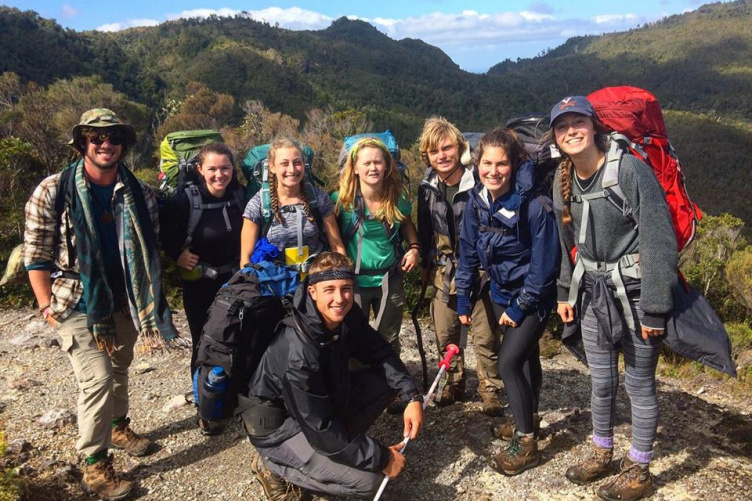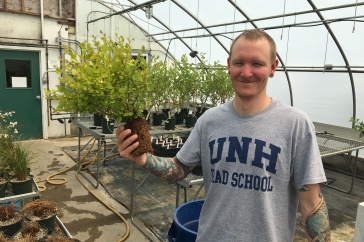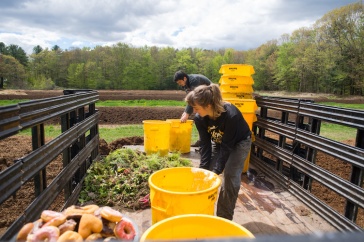
Jesse Vaughan '17 (front) and Tim Curry '17 (far left) pose with fellow EcoQuest partipants in the Coromandel Ranges.
Imagine exploring subtropical forests, sub-Antarctic mountains in the Southern Alps, snorkeling through a marine reserve in the Kaikoura Penisula, all while earning college credits. EcoQuest, one of UNH’s longstanding study abroad programs, sends a small group of students to New Zealand every semester, providing them with the opportunity to take part in such adventures.
Jesse Vaughan ’17, an environmental conservation and sustainability (ECS) major, was part of the group that went this past fall. The program encourages and teaches students how to live with less, Vaughan says.

“Being a stranger in a foreign country and learning about what they’re actively doing to help this planet was eye-opening,” Vaughan says. “I can utilize the knowledge I’ve gained in my everyday life now.”
Tim Curry ’17, an environmental and resource economics major, was also part of the fall semester group.
“I went into the program with an open mind, knowing little about ecology,” says Curry. “I now have an entirely new understanding of the environment that I can apply in my major.”
Donna Dowal, director of EcoQuest admissions, says all majors are welcome to apply, but the majority of students she sees in the program have a science background.
She emphasizes the significance of the five-week research project that students conduct during the latter part of the program. The research aims to give back to New Zealand’s restoration ecology, Dowal says.
Vaughan was part of the group that studied Hochsetters's frogs, a species endemic to New Zealand. Vaughan and five other students vigorously searched along streams where this rare species lives, recording the size, age and number of Hochsetter's found. Curry was part of the Warrenheip vegetation survey group, in which students studied native plant species within a protected area.
“When you’re surrounded by things you’re learning about, it’s easier to understand it fully,” says Bob Keefe ’16, a forestry major, who was part of the vegetation group. “EcoQuest gave me a tangible experience in forestry.”

One of the program’s objectives is to teach students about sustainable outcomes. They tend a garden throughout the semester, growing beets, celery, radishes, corn, tomatoes and many herbs. What they don’t grow themselves, they purchase from local sellers and farmers. They also compost all of the program’s food scraps and then use the organic matter in their garden.
Myrilla Hartkopf ’17, an ECS major, participated in the fall 2015 program. She says interacting with the Māori, who are indigenous to New Zealand, was a highlight. EcoQuest participants live among the Māori and meet with them, even taking part in a formal ceremony where the Māori welcome them to New Zealand. Song is a big part of the culture, and students pay their respects by singing to them.
“It was life-changing to be immersed in a different culture for so long,” says Hartkopf. “The people in my group and the people we stayed with became like family.”
The EcoQuest Field Centre, where students and faculty reside during the program, is an hour south of Auckland, the largest city in New Zealand. The students stay in small cabins that overlook three acres of the western shore of the Firth of Thames. They have unlimited use of kayaks and bikes while there. Every year, participants complete a small project at the Field Centre. This past fall, students installed solar panels.

The staff consists of a core group of field experts and academic associates who reside in New Zealand full time. Students have the option of participating in EcoQuests’ 15-week, 16-credit fall and spring programs or a five-week, eight-credit summer session. They study ecology and biogeography of New Zealand, restoration ecology and ecosystem management in New Zealand, environmental policy, planning and sustainability in New Zealand. Course descriptions
"Going abroad, specifically to New Zealand, is something everyone should do given the opportunity," Vaughan says. "It was awesome to escape the business of everyday life and immerse myself in the country's unique and beautiful environment."
In fact, tourism is New Zealand’s largest export; valuing and protecting their natural enviroment helps drive the economy.
“It’s a great change of pace,” Hartkopf says. “Instead of learning in a classroom, you’re in the field using real-world applications, touching, seeing and experiencing.”
-
Written By:
Cierra Dubinsky '17 | Communications and Public Affairs | cmy945@wildcats.unh.edu



















































